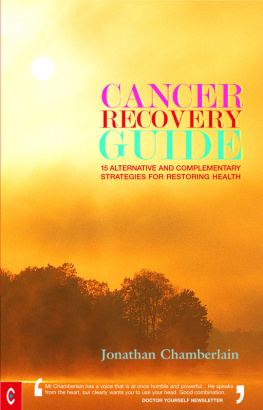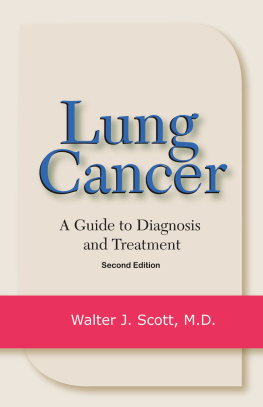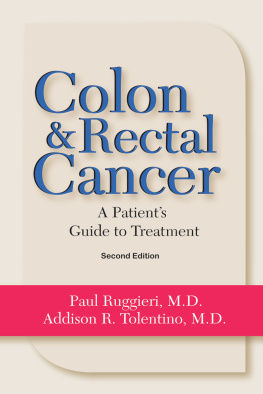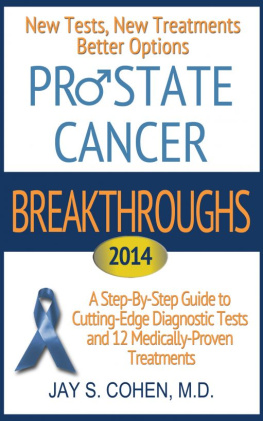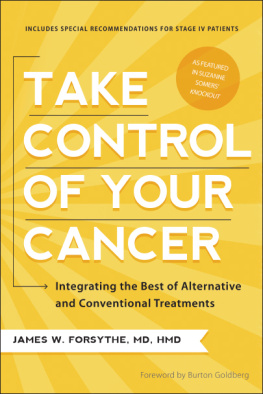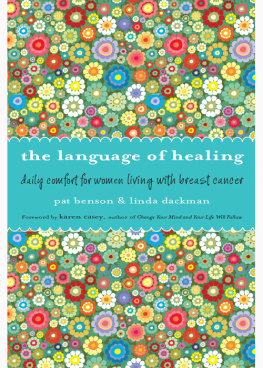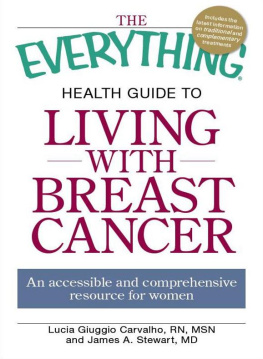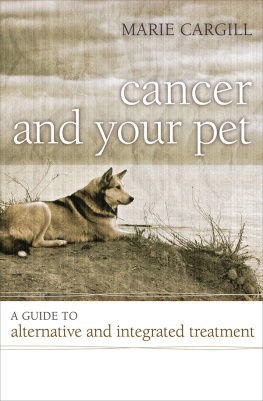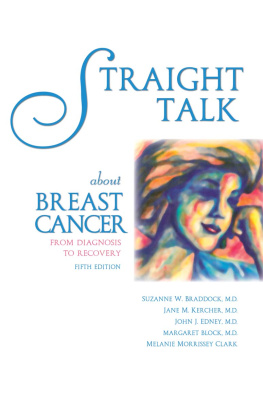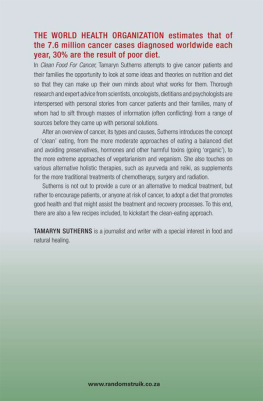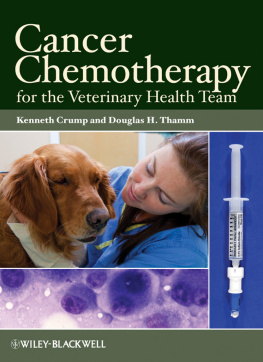JONATHAN CHAMBERLAIN was brought up in Ireland and Hong Kong, where he lived for many years working as a teacher and writer. His previous works include Cancer: The Complete Recovery Guide, and his website on cancer-related issues is www.fightingcancer.com. He has also written Chinese Gods, An Introduction to Chinese Folk Religion and King Hui, the man who owned all the opium in Hong Kong. Jonathan is also the founder of two charities: The Hong Kong Down Syndrome Association and Mental Handicap Network China Ltd.
CANCER RECOVERY GUIDE
15 ALTERNATIVE AND COMPLEMENTARY
STRATEGIES FOR RESTORING HEALTH
Jonathan Chamberlain

For Bernadette
Clairview Books
Hillside House, The Square
Forest Row, East Sussex
RH18 5ES
www.clairviewbooks.com
Published by Clairview 2012
Jonathan Chamberlain 2008
Jonathan Chamberlain asserts the moral right to be identified as the author of this work
The views expressed in this book are those of Jonathan Chamberlain and not necessarily those of any other person or organization unless explicitly stated
While the author has made every effort to provide accurate internet addresses at the time of publication, neither the publisher nor the authors assume any responsibility for errors or for changes that occur after publication
All rights reserved. No part of this publication may be reproduced, stored in a retrieval system, or transmitted, in any form or by any means, electronic, mechanical, photocopying or otherwise, without the prior permission of the publishers
A catalogue record for this book is available from the British Library
ISBN 978 1 905570 43 0
Cover by Andrew Morgan Design
Typeset by DP Photosetting, Neath, West Glamorgan
Contents
Disclaimer
The information contained in this book is not intended to serve as a replacement for professional medical advice. Any use of the information is at the readers discretion. The author and publisher specifically disclaim any and all liability arising directly or indirectly from the use or application of any information contained in this book. A health care professional should be consulted regarding your specific situation.
Acknowledgements
This book is the result of a long journey that started when I borrowed my first book from the resource centre set up by the Hong Kong Cancer Fund. To them I am forever indebted. I must also thank the hundreds of authors and researchers whose work I have benefited from. The battle for truth in the world of cancer is ongoing. The power of the pharmaceutical companies must not be underestimated. Everyone who has contributed information to any alternative health internet forum has helped to resist this power. This book has benefited from many of these contributions of knowledge and experience.
On a more personal level, I would like to acknowledge the help and support of Margit Whitton and Louise Aylward who have kept me on track; Leonard Rosenbaum for his promptings and suggestions; Jack Gontier who forced me to restructure the information I had and in doing so opened up the possibility for this book to be written; Dr Shamim Daya who introduced me to a number of new therapies; and Sevak Gulbekian for agreeing to publish this book, recognizing that it is an important contribution to the national debate on orthodox versus alternative therapies in the case of cancer.
Preface
You have been diagnosed with cancer, or someone close to you has been; or you are wise enough to prepare for that possibility well in advancebecause who knows when it will strike? You, along with everyone else in North America and western Europe, currently have a 4050% likelihood of getting cancer at some time in your life and it makes sense to know what your options are.
For me cancer can be likened to a juggernaut hurtling down a narrow road. If you keep your eye on it you have some chance of not being hit.
My reason for writing this book is to give you a quick run-through of the major strategies that are being followed in the area known as complementary or alternative medicine (CAM); in the case of cancer, I believe these strategies to be far superior to the orthodox strategies (surgery, radiation and chemotherapy). This is not because I am opposed to western medicine, which is far superior to any alternative when it comes to dealing with physical trauma, for example. But it has not proven to be very successful against cancer. The reason for this will become clear as the discussion progresses. The fact that there are so many alternative approaches out there is a clear demonstration that there is a big problem with the orthodox approach. If doctors could cure cancer there would be no need for this over-abundance of alternative approaches. And as this book will make clear, many of these approaches make very good sense. Indeed you will read in the following pages a number of stories of people who used alternative methods to cure their cancers.
Many people equate, in a dismissive way, alternative medicine with, in the words of a friend of mine, New Age nonsense. By this they mean that it is wishful thinking, that it has the savour of anti-scientific mysticism. This assumption needs to be quashed right from the start. All of the approaches described here in this book are based on solid science or observation or credible experience.
Before I begin, Id like to introduce myself and explain how it is I came to write this book.
Thirteen years ago my wife Bernadette was diagnosed with cancer. She did what we all thought was the sensible thing. She followed the advice of the oncologists. She underwent exploratory surgery followed by radiation and chemotherapy. She was dead a year later. She could not have died quicker if wed done nothing. And that year was a year of great pain for her as she suffered through her treatmentsand great pain for me as I sought desperately and fruitlessly to find some route to a cure in the books I found in the bookshop, the library and the local cancer support centre.
Eventually, I came to realize that the book I was looking for didnt exist. I wanted a book that would take me by the hand and tell me what all the options were, what their rationales were and why there were problems with the orthodox approaches. So I wrote Fighting Cancer: A Survival Guide.
Since then, far more information has become availablethe internet has explodedand over the last two years I have spent a great deal of time updating the book. The result is now so comprehensive that I feel no hesitation in retitling it Cancer: The Complete Recovery Guide. (For details see www.fightingcancer.com.) But at more than 500 pages this may seem too burdensome a readespecially for those of you who are desperate for a quick answer to the question: What should I do now?
Cancer Recovery Guide is the book for you now. The Complete Recovery Guide can wait until you are more settled and comfortable with your changed circumstances.
I am absolutely convinced that Bernadette would be alive today if, firstly, I knew then as much as I do now and, secondly, I could persuade her of that fact.
That last sentence encapsulates the central quandary that many cancer patientsalong with their families and their friendsare faced with. The person doing the research isnt necessarily the person who needs to make the decision.
On the one hand, there is the problem of knowing what to do (there are many options); on the other, there is the problem of how to get this information to the person who needs to make the decision. In the end the decision has to be made by the person who has the cancer and everyone else needs eventually to accept that factbut they would be deficient in their love and friendship if they did not seek to influence that decision.
Next page
